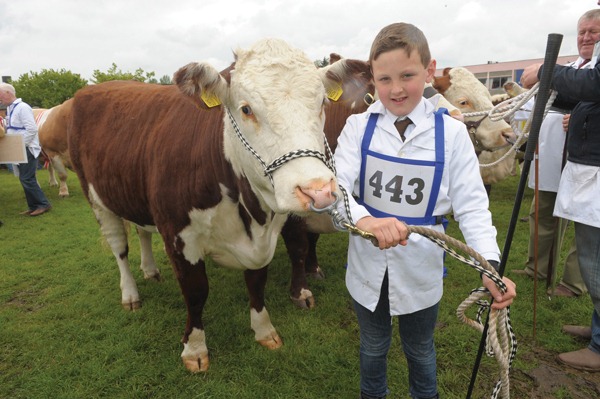The King’s Hall’s final Balmoral Show
Meadhbh Monahan was among approximately 80,000 visitors who flocked to the 114th Balmoral Show, the last to take place at the King’s Hall site.
A sense of nostalgia pervaded the King’s Hall showground, where the Balmoral Show has been held since June 1896.
Visitors were once again treated to a high calibre of competition and showmanship in the pedigree horse, pony, cattle, sheep, poultry, pig and goat categories, while enjoying the colourful entertainment including falconry, sheep shearing competitions, young machinery handler competitions, the children’s farm and the equestrian stunt team. Other favourites included the Balmoral food and craft villages and the ‘best dressed’ competition.
The Royal Ulster Agricultural Society (RUAS), which owns the King’s Hall site, wants to sell the showground land in order to continue in its objective of promoting agriculture in Northern Ireland by holding agricultural shows and exhibitions and lectures.
Speaking at an OFMDFM Committee meeting held at the Balmoral Show on 16 May, RUAS Chief Executive Colin McDonald explained that the King’s Hall has to raise money in order to compete with the Odyssey, the Waterfront Hall, the Titanic signature building and Dublin venues that are easily accessed via the motorway and the Dublin Port Tunnel.
The RUAS has constructed a ‘legacy project’, which the majority of its members voted for on 12 June. That project will see the sale of the Balmoral site for residential development and the King’s Hall being used for a profitable and sustainable purpose. The project document, seen by MLAs, says that the King’s Hall “will house blue chip companies of global renown.” However, when pressed by the committee, McDonald said that a confidentiality agreement is in place.
The RUAS will enter into a development agreement to build ‘Balmoral Park’ on the Maze site in three phases:
- Phase one: the Balmoral Show will open its doors on the new site in May 2013, with an entrance canopy and a start being made on an energy park where demonstrations of green technology would take place.
- Phase two: a headquarters for ‘like-minded bodies’ would be constructed, potentially including the Countryside Access and Activities Network, the Community Foundation for Northern Ireland, the South Eastern Regional College, the Ulster Farmers’ Union, the Ulster Wildlife Trust, the Young Farmers’ Clubs of Ulster and the Department of Agriculture and Rural Development.A DARD spokesman could not confirm whether the department’s headquarters will be located on the site.
- Phase three: an international exhibition facility would be built when “the site has gained a foothold” and a link to the motorway (i.e. light rail or shuttle link) has been established.
The RUAS has been working with the Maze/Long Kesh programme delivery unit to make sure that its plans fit with others on the site, such as the conflict resolution centre.
The views from farmers at the show were mixed.
“People don’t like change. There’s a sense of history and a sense of place here,” Limousin breeder Jim Scott told agendaNi. “I’ve been coming here for 30 years. I won Supreme Champion ten years ago; that’s a special memory for me that happened here,” he reflects. The move to the Maze would be “bad,” he states. “I’ll go and see it, but may not go back.”
For Patrick Donnelly, whose Suffolk sheep had just won the Champion of Show award, “the sooner we are out, the better.” The Balmoral site is “cramped” and inefficient, he believes. He currently has to park quite a distance away and can only have his sheep present for one day of the show. A bigger site, with easier parking and the ability for the animals to be seen by more visitors, would be good for agriculture and for his business, he stresses.
Reflecting on the RUAS’ plans for the future, Ulster Young Farmers’ membership director Jane Kilpatrick explained that preparing for the future is essential in farming. “Farming is a generational thing.” Members are taught skills such as ‘family farm succession’ in order to learn “the implications if you don’t plan successfully for the future of farming.”






